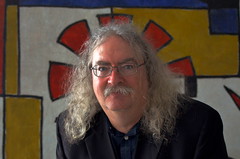Not appreciating that politician, I was curious to know more. Moreover I found it a severe shortcoming not to be at least somewhat familar with Rand's philosophy. As usual I turned to the net and found lots of pros and cons and I realized that she must be quite a controversial writer. Searching for her literary production, I found two books that could be downloaded for free (otherwise they are non-existant to me) The Fountainhead and Anthem. Having read The Fountainhead halfways I happend to view Stephen Downes's My Scholarly Contributions, which of course have nothing to do with Rand's contributions.
I find it highly unlikely, that Stephen Downes would appreciate to be connected to Rand's work because of the altruism he exhibits on the net. Still I cannot help thinking of Rand's hero Howard Roark (as far as I have read; I might be completely wrong here).
To make a long story short, Roark is a young architect who didn't manage to finish his exam because he could not compromise with his ideals even if this attitude has severe consequences for him. Sorry for this comparison, Stephen but this far in my reading, I have began to feel a kind of sympathy for Roark.
Those reading my blog, already know that I have an amost unhealthy admiration for Downes's work. When I read the blogpost My Scholarly Contributions in which Downes responds to a request from a reader to rank his contributions, Downes says he is not prepared to rank his work but he mentions what he considers important without a particular order. However, it is the advice he gives to the reader which I find so remarkably exquisite that I thought I must repeat them in my own blog. Actually, I think they might be converted into a poster on the wall in every academic's office.
Downes's advice to anyone who wants to produce something meaningful and valuable (slightly rephrased by me):
- Pursue what you find to be right and true (you won't be rich)
- Do what you need to stay employed ("one hand for the ship and one for yourself")
- Focus on serving others, not enriching yourself, because the work will have no value to yourself otherwise
- Write from your heart; don't be slave to academic form, but don't ignore it
- Back up your reasoning with evidence from what you know and what you have experienced, not from what you have been told
- Argument seldom convinces anyone but the understanding of principles of reasoning is to protect yourself, it is not to correct other peoples' errors
- Not everyone will support you but if you are true to your principles that won't matter
- In the end of life the only thing that matters to you is what you gave the world, not what you took from it. Share!
Thank you Stephen for sharing this. I realise that my comparison with the selfish ”egotist” Roark is most unfair, but like Roark I believe you could have reached any position had this been on your agenda.

Detta verk är licensierat under en Creative Commons Erkännande-IckeKommersiell-DelaLika 2.5 Sverige Licens.





Den här kommentaren har tagits bort av skribenten.
SvaraRaderaHere comes my comment again ....
SvaraRaderaLE, as usual, your contributions to people's personal development are brilliant.
I will follow your word and share:
"And, at the end of life, the only thing that will matter to you will be what you gave to the world, not what you took from it. Share."
PD: Hope you are doing fine, everything is fine with me, reading your blog as much as normal life allows me :) I am on holiday right now. Hälsingar
Thank you, Mercè. I am so satisfied if my writings can be of any value. Hope you are doing well.
SvaraRaderaNow, I have already shared in my blog http://copwenger.blogspot.com.es/2013/02/share.html#!/2013/02/share.html
SvaraRaderaI am a little bit concern about the sentece "Argument seldom convinces anyone but the understanding of principles of reasoning is to protect yourself, it is not to correct other peoples' errors" remembering the book "Reality by desing" by Petraglia where argumentation was the base of education or might I be confused and Stephen talks about another kind of argumentation different from Petraglia?
Well, I cannot talk for Stephen but if you think of politicians they will hardly ever change their minds no matter how convincing arguments are brought. I guess most people try to uphold a view of knowing best. Ideally though we engage in explorative talk meaning that we open up for a possible change when we hear good arguments. Nice to hear that you still remember Petraglia. I think hos view is highly relevant when it comes to scientific knowledge or what we generally consider to be true.
SvaraRadera